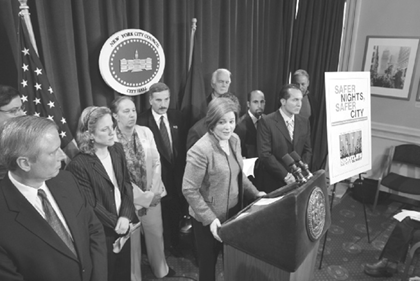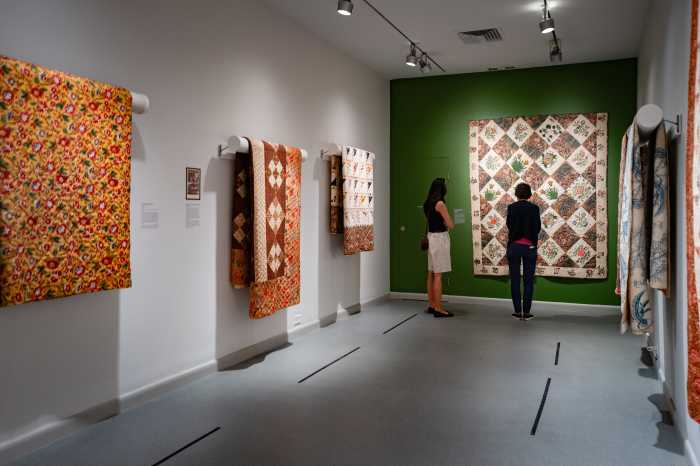By Albert Amateau
At the end of 2006 — a year marked by the tragic deaths of patrons of Manhattan clubs — the New York City Council and State Liquor Authority introduced separate proposals to reform nightlife security and to change the way liquor licenses are issued and regulated.
Members of the New York Nightlife Association on Dec. 28 joined City Council Speaker Christine Quinn and the city’s coordinator of criminal justice at City Hall to present a 26-page report, “Safer Nights, Safer City,” with 15 proposals to regulate the city’s $9.7 billion-per-year nightlife industry. The report grew out of a Nightlife Safety Summit meeting in September of city officials, law enforcement agencies and industry leaders.
About a week earlier, the State Liquor Authority presented a report to outgoing Governor Pataki and incoming Governor Spitzer on overhauling the way bars, nightclubs and restaurants are licensed for the sale and consumption of alcohol. The S.L.A. report is the result of a review last September by a task force composed of state legislators, local government and law enforcement officials, community leaders, community board representatives and nightlife industry leaders.
At City Hall last week, Quinn and Robert Bookman, attorney for the New York Nightlife Association, hailed the nightlife safety report for outlining an unprecedented agreement between nightlife operators and police to work together on solving problems involving bars and clubs.
John Feinblatt, the city’s coordinator of criminal justice, lauded the recommendations as an important step to opening lines of communication between the nightlife industry and law enforcement officials.
The report calls for establishing a nightlife-New York Police Department working group to foster communications and cooperation between owners and police and to develop “best practices” codes for club bouncers. The report also suggested establishing a new mayoral office for the nightlife industry.
Issues designated for further Council action beginning in January include dealing with underage patrons (younger than 21) acquiring and using false I.D. to buy and consume alcohol, and targeting the makers and sellers of false I.D.’s.
City legislation to require problem clubs to hire independent monitors to oversee compliance with regulations and to require the use of surveillance cameras at entrances and exits of nightlife venues are also among the recommendations. Giving the police increased authority to close premises where repeated violent felonies occur was high on the list of enforcement proposals.
Separate from regulating the sale of alcohol, another recommendation calls for raising the age of admission to clubs from 16 to 18.
However, a proposal for specific legislation to suspend drivers’ licenses of underage people convicted of using false I.D. to buy alcoholic beverages was not included in the report, although it was discussed at the September summit. The issue was covered only generally: “Increased accountability for teenagers who use fake I.D.’s to attempt to gain admittance to bars and clubs” was the way the report read on the matter.
Paid detail — allowing owners to hire off-duty police to work as club security — was not one of the recommendations, although it was raised at the September security summit and strongly supported by the nightlife association. Forbidden in New York City since the end of Prohibition because of its potential for conflicting loyalties and corruption, paid detail is opposed by Police Commissioner Ray Kelly.
Bookman said that while the nightlife association was anxious about the enforcement and monitoring recommendations, the positive elements of the Safer Nights report far outweighed the doubts.
“Terms like ‘historic’ and ‘unprecedented’ are often hyperbole, but in this case they’re not exaggerations,” Bookman said.
David Rabin, owner of Lotus club on W. 14th St. and president of the nightlife association, said, “We have been trying to reach out to police for the past seven years.”
“As with most things, the devil is in the details,” Bookman told reporters after the City Hall announcement. “We want to be certain that expanding police powers to close a place doesn’t mean defining a bar as a problem just because there were 300 calls to 311 made by just a few people.”
The September Nightlife Safety Summit, chaired by Jeremy Travis, president of John Jay College of Criminal Justice, was a reaction to the murder in February of Imette St. Guillen, a John Jay student, after a night out. A bouncer at The Falls, a former Soho lounge, is charged in St. Guillen’s death.
Rosemary Arnold, attorney for the St. Guillen family, told the group at last week’s City Hall event that the family was pleased to see efforts to make New York City nightlife safer.
In May, four patrons of Opus 22, a Chelsea club, were shot, one of them fatally and another permanently paralyzed. An Opus 22 bouncer is charged in the murder.
In July, Jennifer Moore, 18, was murdered after being picked up on the West Side Highway after a night of drinking at Chelsea clubs. Guest House, at 527 W. 27th St., was one of the last places the underage Moore was drinking. Jon Bahkshi, owner of Guest House, attended the City Hall event and spoke in support of the Safer Nights report.
The State Liquor Authority report on overhauling the way the state issues and renews alcohol licenses proposed several changes recommended by a task force headed by Daniel Boyle, the S.L.A.’s lead commissioner, and Joshua Toas, S.L.A. executive director.
New on-premises license designations would distinguish restaurants, taverns, wine bars and other types, and owners would be held to the terms and conditions of their licenses, according to the report.
New mixed-use licenses would indicate, for example, that a place that operates as a restaurant during the early evening operates as a club after dining hours. Owners would be required to file parts of their licenses detailing hours of operation, inclusion of live entertainment, patron dancing and other specifics with community boards.
The agency will also seek power to disapprove renewals, or to issue probationary renewals, for places with a history of not complying with regulations.
The S.L.A. will also seek access to criminal records to check on the background of license applicants and employees. The agency currently does not have the right to access those records.
The week before New Year’s Eve, the S.L.A. announced it would exercise its right to deny special permits to allow bars and clubs with matters pending before the agency to stay open beyond the usual 4 a.m. closing until 6 a.m. on New Year’s.
There were 459 applications to stay open beyond 4 a.m. on New Year’s
Day and the S.L.A. denied 37 of them.
Webster Hall, on E. 11th St., and Guest House in Chelsea, which were denied the late closing at first, won a reversal on appeal, and got the permits.
Among the establishments denied the 6 a.m. closing were Sin Sin, on Second Ave. at E. Fifth St.; Le Souk, at 47 Avenue B; Carthage Palace, at 46 Avenue B; Lion’s Den, at 214 Sullivan St.; three bars in the building at 530 W. 28th St., where Crobar, Spirit, BED and Home are located; and Avalon at Sixth Ave. and 20th St.
Albert@DowntownExpress.com


































